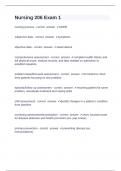Nursing 206 Exam 1
nursing process - correct answer ✔ADPIE
subjective data - correct answer ✔symptoms
objective data - correct answer ✔observations
comprehensive assessment - correct answer ✔complete health history and
full physical exam, medical records, and labs needed on admission to
establish baseline
problem based/focused assessment - correct answer ✔for limited or short
term patients focusing on one problem
episodic/follow up assessment - correct answer ✔returning patient for same
problem, reevaluate treatment and coping skills
shift assessment - correct answer ✔identify changes in a patient's condition
from baseline
screening assessment/examination - correct answer ✔short, focused exam
for disease detection and health promotion (ex. pap smear)
primary prevention - correct answer ✔preventing disease (ex.
immunizations)
,secondary prevention - correct answer ✔early detection/screening (ex. pap
smears)
tertiary prevention - correct answer ✔treatment/control (ex. diabetes
management)
health history goals - correct answer ✔gather data, create careplan, promote
health
internal communication factors - correct answer ✔linking others, non-
judgement, empathy, listening
external communication factors - correct answer ✔privacy, reduce
interruptions, physical environment, dress, note taking
what type of questions are used at the beginning of an interview? - correct
answer ✔open-ended
what type of questions are used to give more precise information? - correct
answer ✔close-ended
what type of questions lead patient to focus on one set of thoughts? - correct
answer ✔directive
techniques of communication - correct answer ✔active listening, facilitation,
clarification, restatement, reflection, confrontation, interpretation, summary
what type of data is in a health history? - correct answer ✔subjective
, health history sequence - correct answer ✔biographical data, reason for
seeking care, present health or history of present illness, past health history,
family history, review of systems, personal and psychosocial history
what should biographical data not contain? - correct answer ✔names
reason for seeking care - correct answer ✔OLD CARTS: onset, location,
duration, characteristics, aggravating factors, related symptoms, treatment,
severity
how should reason for seeking care be documented? - correct answer ✔in
patient words and quotations
present health or history of present illness - correct answer ✔chronic
conditions (date of diagnosis, impact on quality of life), allergies, medications
(name, dose, frequency, purpose), immunizations
past health history - correct answer ✔name/type, date, and outcome
family history - correct answer ✔genogram
what should genogram include? - correct answer ✔age, health status, death
what should genogram not include? - correct answer ✔names
review of systems (ROS) - correct answer ✔ask open-ended questions and
then close-ended questions to look for problems




